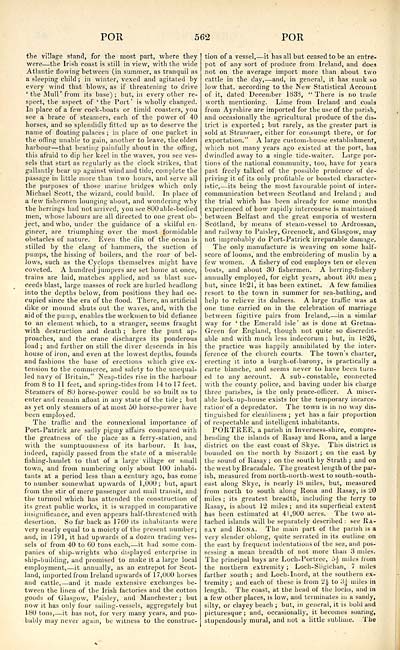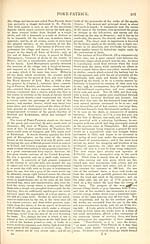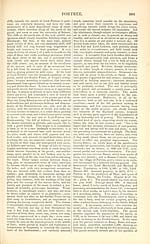Topographical, statistical, and historical gazetteer of Scotland > Volume 2
(578) Page 562
Download files
Complete book:
Individual page:
Thumbnail gallery: Grid view | List view

POR
562
POR
the village stand, for the most part, where they
were — the Irish coast is still in view, with the wide
Atlantic flowing between (in summer, as tranquil as
a sleeping child ; in winter, vexed and agitated by
every wind that blows, as if threatening to drive
' the Mull' from its base); but, in every other re-
spect, the aspect of 'the Port' is wholly changed.
In place of a few cock-boats or timid coasters, you
see a brace of steamers, each of the power of 40
horses, and so splendidly fitted up as to deserve the
name of floating palaces ; in place of one packet in
the offing unable to gain, another to leave, the olden
harbour — that beating painfully about in the offing,
this afraid to dip her keel in the waves, you see ves-
sels that start as regularly as the clock strikes, that
gallantly bear up against wind and tide, complete the
passage in little more than two hours, and serve all
the purposes of those marine bridges which only
Michael Scott, the wizard, could build. In place of
a few fishermen lounging about, and wondering why
the herrings had not arrived, you see 800 able-bodied
men, whose labours are all directed to one great ob-
ject, and who, under the guidance of a skilful en-
gineer, are triumphing over the most formidable
obstacles of nature. Even the din of the ocean is
stilled by the clang of hammers, the suction of
pumps, the hissing of boilers, and the roar of bel-
lows, such as the Cyclops themselves might have
coveted. A hundred jumpers are set home at once,
trains are laid, matches applied, and as blast suc-
ceeds blast, large masses of rock are hurled headlong
into the depths below, from positions they had oc-
cupied since the era of the flood. There, an artificial
dike or mound shuts out the waves, and, with the
aid of the pump, enables the workmen to bid defiance
to an element which, to a stranger, seems fraught
with destruction and death ; here the punt ap-
proaches, and the crane discharges its ponderous
load; and farther on still the diver descends in his
house of iron, and even at the lowest depths, founds
and fashions the base of erections which give ex-
tension to the commerce, and safety to the unequal-
led navy of Britain." Neap-tides rise in the harbour
from 8 to 11 feet, and spring-tides from 14 to 17 feet.
Steamers of 80 horse-power could be so built as to
enter and remain afloat in any state of the tide ; but
as yet only steamers of at most 50 horse-power have
been employed.
The traffic and the connexional importance of
Port-Patrick are sadly pigmy affairs compared with
the greatness of the place as a ferry-station, and
with the sumptuousness of its harbour. It lias,
indeed, rapidly passed from the state of a miserable
fishing-hamlet to that of a large village or small
town, and from numbering only about 100 inhabi-
tants at a period less than a century ago, has come
to number somewhat upwards of 1,000; but, apart
from the stir of mere passenger and mail transit, and
the turmoil which has attended the construction of
its great public works, it is wrapped in comparative
insignificance, and even appears half-threatened with
desertion. So far back as 1760 its inhabitants were
very nearly equal to a moiety of the present number;
and, in 1791, it had upwards of a dozen trading ves-
sels of from 40 to 60 tons each, — it had some com-
panies of ship-wrights who displayed enterprise in
ship-building, and promised to make it a large local
employment, — it annually, as an entrepot for Scot-
land, imported from Ireland upwards of 17,000 horses
and cattle, — and it made extensive exchanges be-
tween the linen of the Irish factories and the cotton
goods of Glasgow, Paisley, and Manchester ; but
now it has only four sailing-vessels, aggregately but
180 tons, — it has not, for very many years, and puo-
bably may never again, be witness to the construc-
tion of a vessel, — it has all but ceased to be an entre-
pot of any sort of produce from Ireland, and does
not on the average import more than about two
cattle in the day, — and, in general, it has sunk so
low that, according to the JNew Statistical Account
of it, dated December 1833, " There is no trade
worth mentioning. Lime from Ireland and coals
from Ayrshire are imported for the use of the parish,
and occasionally the agricultural produce of the dis-
trict is exported ; but rarely, as the greater part is
sold at Stranraer, either for consumpt there, or for
exportation." A large custom-house establishment,
which not many years ago existed at the port, has
dwindled away to a single tide-waiter. Large por-
tions of the national community, too, have for years
past freely talked of the possible prudence of de-
priving it of its only profitable or boasted character-
istic, — its being the most favourable point of inter-
communication between Scotland and Ireland ; and
the trial which has been already for some months
experienced of how rapidly intercourse is maintained
between Belfast and the great emporia of western
Scotland, by means of steam-vessel to Ardrossan,
and railway to Paisley, Greenock, and Glasgow, may
not improbably do Port-Patrick irreparable damage.
The only manufacture is weaving on some halt-
score of looms, and the embroidering of muslin by a
few women. A fishery of cod employs ten or eleven
boats, and about 30 fishermen. A herring-fishery
annually employed, for eight years, about 100 men ;
but, since 1821, it has been extinct. A few families
resort to the town in summer for sea-bathing, and
help to relieve its dulness. A large traffic was at
one time carried on in the celebration of marriage
between fugitive pairs from Ireland, — -ia a similar
way for 'the Emerald isle' as is done at Gretna-
Green for England, though not quite so discredit-
able and with much less indecorum; but, in 1826,
the practice was happily annihilated by the inter-
ference of the church courts. The town's charter,
erecting it into a burgh-of-barony, is practically a
carte blanche, and seems never to have been turn-
ed to any account. A sub -constable, connected
with the county police, and having under his charge
three parishes, is the only peace-officer. A miser-
able lock-up-house exists for the temporary incarce-
ration' of a depredator. The town is in no way dis-
tinguished for cleanliness ; yet has a fair proportion
of respectable and intelligent inhabitants.
PORTREE, a parish in Inverness-shire, compre-
hending the islands of Rasay and Rona, and a large
district on the east coast of Skye. This district is
bounded on the north by Snizort ; on the east by
the sound of Rasay ; on the south by Strath ; and on
the west by Bracadale. The greatest length of the par-
ish, measured from north-north-west to south-south-
east along Skye, is nearly Its miles, but, measured
from north to south along Rona and Rasay, is 20
miles ; its greatest breadth, including the terry to
Rasav, is about 12 miles ; and its superficial extent
has been estimated at 41,900 acres. The two at-
tached islands will be separately described : see Ra-
say and Rona. The main part of the parish is a
very slender oblong, quite serrated in its outline on
the east by frequent indentations of the sea, and pos-
sessing a mean breadth of not more than 3 miles.
The principal bays are Loch-Portree, o£ miles from
the northern extremity ; Loch-Sligichan, 7 miles
farther south ; and Loch-Inord, at the southern ex-
tremity ; and each of these is from 2 J to 3£ miles in
length. The coast, at the head of the lochs, and in
a few other places, is low, and terminates in a sandy,
silty, or clayey beach ; but, in general, it is bold and
picturesque ; and, occasionally, it becomes soaring,
stupendously mural, and not a little sublime. The
562
POR
the village stand, for the most part, where they
were — the Irish coast is still in view, with the wide
Atlantic flowing between (in summer, as tranquil as
a sleeping child ; in winter, vexed and agitated by
every wind that blows, as if threatening to drive
' the Mull' from its base); but, in every other re-
spect, the aspect of 'the Port' is wholly changed.
In place of a few cock-boats or timid coasters, you
see a brace of steamers, each of the power of 40
horses, and so splendidly fitted up as to deserve the
name of floating palaces ; in place of one packet in
the offing unable to gain, another to leave, the olden
harbour — that beating painfully about in the offing,
this afraid to dip her keel in the waves, you see ves-
sels that start as regularly as the clock strikes, that
gallantly bear up against wind and tide, complete the
passage in little more than two hours, and serve all
the purposes of those marine bridges which only
Michael Scott, the wizard, could build. In place of
a few fishermen lounging about, and wondering why
the herrings had not arrived, you see 800 able-bodied
men, whose labours are all directed to one great ob-
ject, and who, under the guidance of a skilful en-
gineer, are triumphing over the most formidable
obstacles of nature. Even the din of the ocean is
stilled by the clang of hammers, the suction of
pumps, the hissing of boilers, and the roar of bel-
lows, such as the Cyclops themselves might have
coveted. A hundred jumpers are set home at once,
trains are laid, matches applied, and as blast suc-
ceeds blast, large masses of rock are hurled headlong
into the depths below, from positions they had oc-
cupied since the era of the flood. There, an artificial
dike or mound shuts out the waves, and, with the
aid of the pump, enables the workmen to bid defiance
to an element which, to a stranger, seems fraught
with destruction and death ; here the punt ap-
proaches, and the crane discharges its ponderous
load; and farther on still the diver descends in his
house of iron, and even at the lowest depths, founds
and fashions the base of erections which give ex-
tension to the commerce, and safety to the unequal-
led navy of Britain." Neap-tides rise in the harbour
from 8 to 11 feet, and spring-tides from 14 to 17 feet.
Steamers of 80 horse-power could be so built as to
enter and remain afloat in any state of the tide ; but
as yet only steamers of at most 50 horse-power have
been employed.
The traffic and the connexional importance of
Port-Patrick are sadly pigmy affairs compared with
the greatness of the place as a ferry-station, and
with the sumptuousness of its harbour. It lias,
indeed, rapidly passed from the state of a miserable
fishing-hamlet to that of a large village or small
town, and from numbering only about 100 inhabi-
tants at a period less than a century ago, has come
to number somewhat upwards of 1,000; but, apart
from the stir of mere passenger and mail transit, and
the turmoil which has attended the construction of
its great public works, it is wrapped in comparative
insignificance, and even appears half-threatened with
desertion. So far back as 1760 its inhabitants were
very nearly equal to a moiety of the present number;
and, in 1791, it had upwards of a dozen trading ves-
sels of from 40 to 60 tons each, — it had some com-
panies of ship-wrights who displayed enterprise in
ship-building, and promised to make it a large local
employment, — it annually, as an entrepot for Scot-
land, imported from Ireland upwards of 17,000 horses
and cattle, — and it made extensive exchanges be-
tween the linen of the Irish factories and the cotton
goods of Glasgow, Paisley, and Manchester ; but
now it has only four sailing-vessels, aggregately but
180 tons, — it has not, for very many years, and puo-
bably may never again, be witness to the construc-
tion of a vessel, — it has all but ceased to be an entre-
pot of any sort of produce from Ireland, and does
not on the average import more than about two
cattle in the day, — and, in general, it has sunk so
low that, according to the JNew Statistical Account
of it, dated December 1833, " There is no trade
worth mentioning. Lime from Ireland and coals
from Ayrshire are imported for the use of the parish,
and occasionally the agricultural produce of the dis-
trict is exported ; but rarely, as the greater part is
sold at Stranraer, either for consumpt there, or for
exportation." A large custom-house establishment,
which not many years ago existed at the port, has
dwindled away to a single tide-waiter. Large por-
tions of the national community, too, have for years
past freely talked of the possible prudence of de-
priving it of its only profitable or boasted character-
istic, — its being the most favourable point of inter-
communication between Scotland and Ireland ; and
the trial which has been already for some months
experienced of how rapidly intercourse is maintained
between Belfast and the great emporia of western
Scotland, by means of steam-vessel to Ardrossan,
and railway to Paisley, Greenock, and Glasgow, may
not improbably do Port-Patrick irreparable damage.
The only manufacture is weaving on some halt-
score of looms, and the embroidering of muslin by a
few women. A fishery of cod employs ten or eleven
boats, and about 30 fishermen. A herring-fishery
annually employed, for eight years, about 100 men ;
but, since 1821, it has been extinct. A few families
resort to the town in summer for sea-bathing, and
help to relieve its dulness. A large traffic was at
one time carried on in the celebration of marriage
between fugitive pairs from Ireland, — -ia a similar
way for 'the Emerald isle' as is done at Gretna-
Green for England, though not quite so discredit-
able and with much less indecorum; but, in 1826,
the practice was happily annihilated by the inter-
ference of the church courts. The town's charter,
erecting it into a burgh-of-barony, is practically a
carte blanche, and seems never to have been turn-
ed to any account. A sub -constable, connected
with the county police, and having under his charge
three parishes, is the only peace-officer. A miser-
able lock-up-house exists for the temporary incarce-
ration' of a depredator. The town is in no way dis-
tinguished for cleanliness ; yet has a fair proportion
of respectable and intelligent inhabitants.
PORTREE, a parish in Inverness-shire, compre-
hending the islands of Rasay and Rona, and a large
district on the east coast of Skye. This district is
bounded on the north by Snizort ; on the east by
the sound of Rasay ; on the south by Strath ; and on
the west by Bracadale. The greatest length of the par-
ish, measured from north-north-west to south-south-
east along Skye, is nearly Its miles, but, measured
from north to south along Rona and Rasay, is 20
miles ; its greatest breadth, including the terry to
Rasav, is about 12 miles ; and its superficial extent
has been estimated at 41,900 acres. The two at-
tached islands will be separately described : see Ra-
say and Rona. The main part of the parish is a
very slender oblong, quite serrated in its outline on
the east by frequent indentations of the sea, and pos-
sessing a mean breadth of not more than 3 miles.
The principal bays are Loch-Portree, o£ miles from
the northern extremity ; Loch-Sligichan, 7 miles
farther south ; and Loch-Inord, at the southern ex-
tremity ; and each of these is from 2 J to 3£ miles in
length. The coast, at the head of the lochs, and in
a few other places, is low, and terminates in a sandy,
silty, or clayey beach ; but, in general, it is bold and
picturesque ; and, occasionally, it becomes soaring,
stupendously mural, and not a little sublime. The
Set display mode to: Large image | Transcription
Images and transcriptions on this page, including medium image downloads, may be used under the Creative Commons Attribution 4.0 International Licence unless otherwise stated. ![]()
| Gazetteers of Scotland, 1803-1901 > Topographical, statistical, and historical gazetteer of Scotland > Volume 2 > (578) Page 562 |
|---|
| Permanent URL | https://digital.nls.uk/97455526 |
|---|
| Description | Volume second: I-Z. |
|---|---|
| Shelfmark | Map Room Ref.2 |
| Attribution and copyright: |
|

